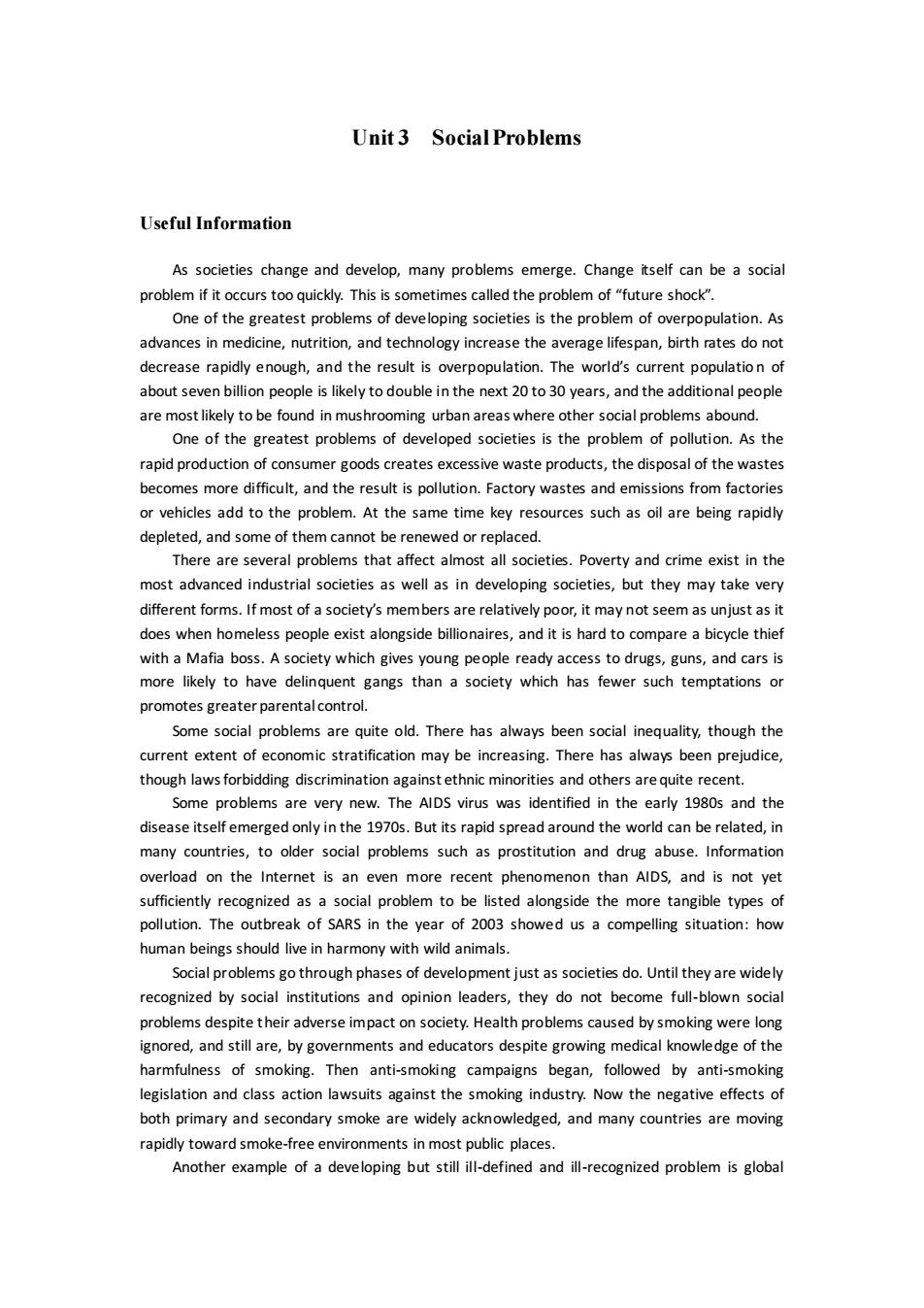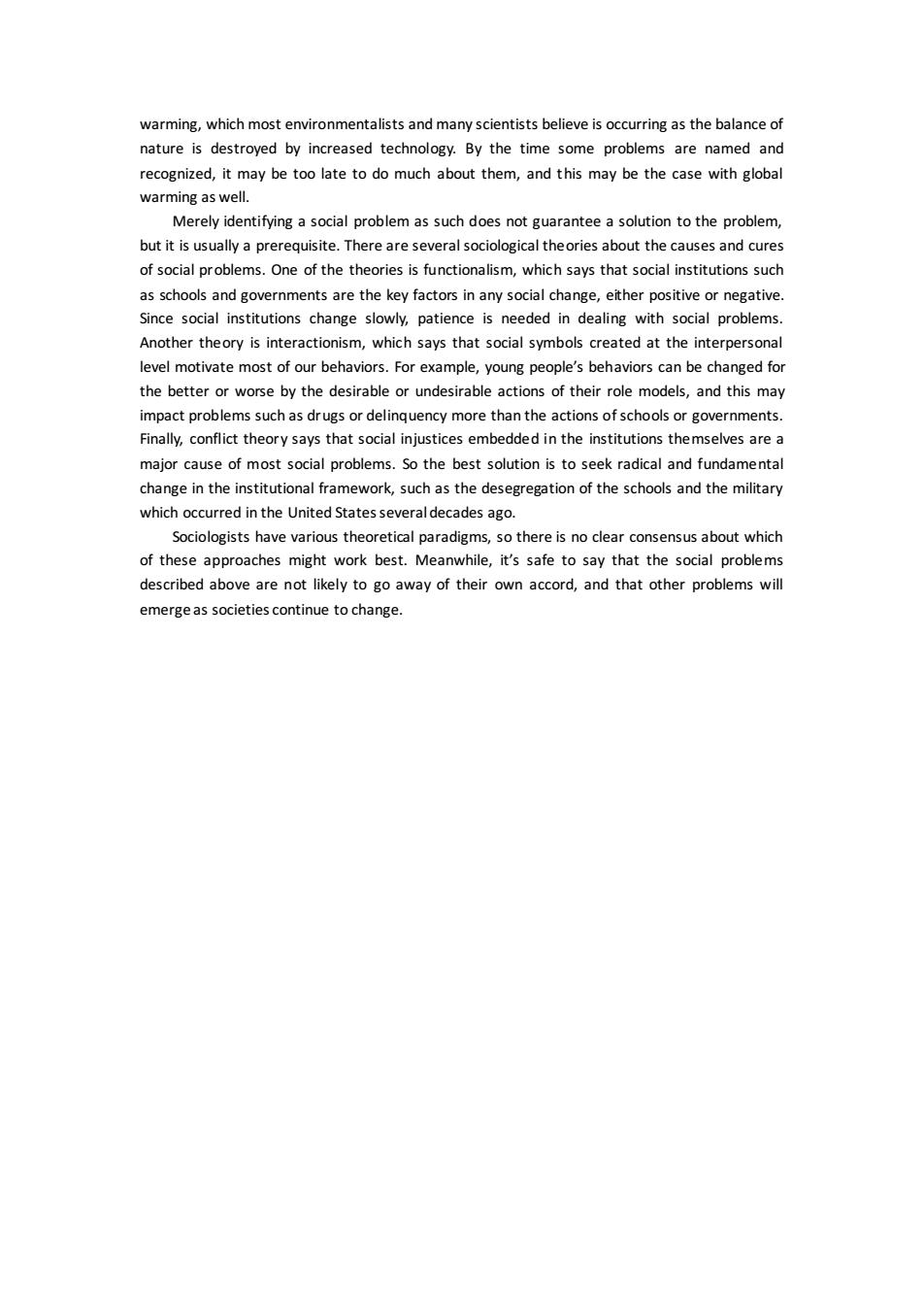
Unit 3 Social Problems Useful Information As societies change and develop,many problems emerge.Change itself can be a social problem if it occurs too quickly.This is sometimes called the problem of "future shock". One of the greatest problems of developing societies is the problem of overpopulation.As advances in medicine,nutrition,and technology increase the average lifespan,birth rates do not decrease rapidly enough,and the result is overpopulation.The world's current populatio n of about seven billion people is likely to double in the next 20 to 30 years,and the additional people are most likely to be found in mushrooming urban areas where other social problems abound. One of the greatest problems of developed societies is the problem of pollution.As the rapid production of consumer goods creates excessive waste products,the disposal of the wastes becomes more difficult,and the result is pollution.Factory wastes and emissions from factories or vehicles add to the problem.At the same time key resources such as oil are being rapidly depleted,and some of them cannot be renewed or replaced. There are several problems that affect almost all societies.Poverty and crime exist in the most advanced industrial societies as well as in developing societies,but they may take very different forms.If most of a society's members are relatively poor,it may not seem as unjust as it does when homeless people exist alongside billionaires,and it is hard to compare a bicycle thief with a Mafia boss.A society which gives young people ready access to drugs,guns,and cars is more likely to have delinquent gangs than a society which has fewer such temptations or promotes greater parental control. Some social problems are quite old.There has always been social inequality,though the current extent of economic stratification may be increasing.There has always been prejudice, though laws forbidding discrimination against ethnic minorities and others are quite recent. Some problems are very new.The AIDS virus was identified in the early 1980s and the disease itself emerged only in the 1970s.But its rapid spread around the world can be related,in many countries,to older social problems such as prostitution and drug abuse.Information overload on the Internet is an even more recent phenomenon than Alds,and is not yet sufficiently recognized as a social problem to be listed alongside the more tangible types of pollution.The outbreak of SARS in the year of 2003 showed us a compelling situation:how human beings should live in harmony with wild animals. Social problems go through phases of development just as societies do.Until they are widely recognized by social institutions and opinion leaders,they do not become full-blown social problems despite their adverse impact on society.Health problems caused by smoking were long ignored,and still are,by governments and educators despite growing medical knowledge of the harmfulness of smoking.Then anti-smoking campaigns began,followed by anti-smoking legislation and class action lawsuits against the smoking industry.Now the negative effects of both primary and secondary smoke are widely acknowledged,and many countries are moving rapidly toward smoke-free environments in most public places. Another example of a developing but still ill-defined and ill-recognized problem is global
Unit 3 Social Problems Useful Information As societies change and develop, many problems emerge. Change itself can be a social problem if it occurs too quickly. This is sometimes called the problem of “future shock”. One of the greatest problems of developing societies is the problem of overpopulation. As advances in medicine, nutrition, and technology increase the average lifespan, birth rates do not decrease rapidly enough, and the result is overpopulation. The world’s current populatio n of about seven billion people is likely to double in the next 20 to 30 years, and the additional people are most likely to be found in mushrooming urban areas where other social problems abound. One of the greatest problems of developed societies is the problem of pollution. As the rapid production of consumer goods creates excessive waste products, the disposal of the wastes becomes more difficult, and the result is pollution. Factory wastes and emissions from factories or vehicles add to the problem. At the same time key resources such as oil are being rapidly depleted, and some of them cannot be renewed or replaced. There are several problems that affect almost all societies. Poverty and crime exist in the most advanced industrial societies as well as in developing societies, but they may take very different forms. If most of a society’s members are relatively poor, it may not seem as unjust as it does when homeless people exist alongside billionaires, and it is hard to compare a bicycle thief with a Mafia boss. A society which gives young people ready access to drugs, guns, and cars is more likely to have delinquent gangs than a society which has fewer such temptations or promotes greater parental control. Some social problems are quite old. There has always been social inequality, though the current extent of economic stratification may be increasing. There has always been prejudice, though laws forbidding discrimination against ethnic minorities and others are quite recent. Some problems are very new. The AIDS virus was identified in the early 1980s and the disease itself emerged only in the 1970s. But its rapid spread around the world can be related, in many countries, to older social problems such as prostitution and drug abuse. Information overload on the Internet is an even more recent phenomenon than AIDS, and is not yet sufficiently recognized as a social problem to be listed alongside the more tangible types of pollution. The outbreak of SARS in the year of 2003 showed us a compelling situation: how human beings should live in harmony with wild animals. Social problems go through phases of development just as societies do. Until they are widely recognized by social institutions and opinion leaders, they do not become full-blown social problems despite their adverse impact on society. Health problems caused by smoking were long ignored, and still are, by governments and educators despite growing medical knowledge of the harmfulness of smoking. Then anti-smoking campaigns began, followed by anti-smoking legislation and class action lawsuits against the smoking industry. Now the negative effects of both primary and secondary smoke are widely acknowledged, and many countries are moving rapidly toward smoke-free environments in most public places. Another example of a developing but still ill-defined and ill-recognized problem is global

warming,which most environmentalists and many scientists believe is occurring as the balance of nature is destroyed by increased technology.By the time some problems are named and recognized,it may be too late to do much about them,and this may be the case with global warming as well. Merely identifying a social problem as such does not guarantee a solution to the problem, but it is usually a prerequisite.There are several sociological theories about the causes and cures of social problems.One of the theories is functionalism,which says that social institutions such as schools and governments are the key factors in any social change,either positive or negative. Since social institutions change slowly,patience is needed in dealing with social problems. Another theory is interactionism,which says that social symbols created at the interpersonal level motivate most of our behaviors.For example,young people's behaviors can be changed for the better or worse by the desirable or undesirable actions of their role models,and this may impact problems such as drugs or delinquency more than the actions of schools or governments. Finally,conflict theory says that social injustices embedded in the institutions themselves are a major cause of most social problems.So the best solution is to seek radical and fundamental change in the institutional framework,such as the desegregation of the schools and the military which occurred in the United States several decades ago. Sociologists have various theoretical paradigms,so there is no clear consensus about which of these approaches might work best.Meanwhile,it's safe to say that the social problems described above are not likely to go away of their own accord,and that other problems will emerge as societies continue to change
warming, which most environmentalists and many scientists believe is occurring as the balance of nature is destroyed by increased technology. By the time some problems are named and recognized, it may be too late to do much about them, and this may be the case with global warming as well. Merely identifying a social problem as such does not guarantee a solution to the problem, but it is usually a prerequisite. There are several sociological theories about the causes and cures of social problems. One of the theories is functionalism, which says that social institutions such as schools and governments are the key factors in any social change, either positive or negative. Since social institutions change slowly, patience is needed in dealing with social problems. Another theory is interactionism, which says that social symbols created at the interpersonal level motivate most of our behaviors. For example, young people’s behaviors can be changed for the better or worse by the desirable or undesirable actions of their role models, and this may impact problems such as drugs or delinquency more than the actions of schools or governments. Finally, conflict theory says that social injustices embedded in the institutions themselves are a major cause of most social problems. So the best solution is to seek radical and fundamental change in the institutional framework, such as the desegregation of the schools and the military which occurred in the United States several decades ago. Sociologists have various theoretical paradigms, so there is no clear consensus about which of these approaches might work best. Meanwhile, it’s safe to say that the social problems described above are not likely to go away of their own accord, and that other problems will emerge as societies continue to change